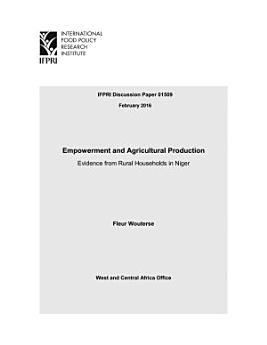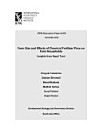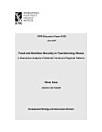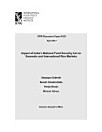Empowerment and agricultural production
Wouterse, Fleur Stephanie
feb. 2016 · IFPRI Discussion Paper Bok 1 · Intl Food Policy Res Inst
E-bok
28
Sidor
family_home
Kvalificerad
info
reportBetyg och recensioner verifieras inte Läs mer
Om den här e-boken
Niger is a landlocked Sahelian country, two-thirds of which is in the Sahara desert, with only one-eighth of the land considered arable. Nevertheless, more than 90 percent of Niger’s labor force is employed in agriculture, which is predominantly subsistence oriented. Since the great famines of the 1970s and 1980s, the country has pursued agrarian intensification through technological change to address challenges to the food security situation. However, this approach has failed to recognize that the main characteristic of the Sahelian part of West Africa is the intricate complexity of the social, environmental, and economic dimensions that differentially affect male and female rural dwellers. One example is the patrilineal tenure system, which under increased population pressure has led to the exclusion of women and youth from agriculture in some areas. The Women’s Empowerment in Agriculture Index (WEAI) indicates that access to land is one important dimension of empowerment. In order to assess the role of empowerment in agricultural production, we use new household- and individual-level WEAI data from Niger and regression analysis. Our results show that empowerment is important for agricultural production and that households in which adult individuals are more empowered are more productive. This means that other and possibly more effective pathways to agrarian intensification exist and important agricultural productivity gains could be made by empowering men and women in rural households.
Betygsätt e-boken
Berätta vad du tycker.
Läsinformation
Smartphones och surfplattor
Installera appen Google Play Böcker för Android och iPad/iPhone. Appen synkroniseras automatiskt med ditt konto så att du kan läsa online eller offline var du än befinner dig.
Laptops och stationära datorer
Du kan lyssna på ljudböcker som du har köpt på Google Play via webbläsaren på datorn.
Läsplattor och andra enheter
Om du vill läsa boken på enheter med e-bläck, till exempel Kobo-läsplattor, måste du ladda ned en fil och överföra den till enheten. Följ anvisningarna i hjälpcentret om du vill överföra filerna till en kompatibel läsplatta.










